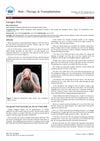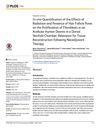
The article concludes that understanding the causes of hair loss and using continuous treatments like minoxidil and finasteride can help manage it, despite potential side effects.
[object Object]  January 2015 in “Hair therapy & transplantation”
January 2015 in “Hair therapy & transplantation” Hair restoration greatly improved George's confidence and self-identity.
 December 2021 in “Dermatology research”
December 2021 in “Dermatology research” Low levels of vitamin B12, ferritin, and calcium are linked to premature graying of hair.
 July 2018 in “Elsevier eBooks”
July 2018 in “Elsevier eBooks” Telogen Effluvium is a common, usually reversible hair loss condition, often improved by removing the trigger and possibly treated with various products, though their effectiveness is uncertain.
 6 citations,
November 2017 in “Skin appendage disorders”
6 citations,
November 2017 in “Skin appendage disorders” Topical botanical lotion increases hair density and improves quality of life in women with hair loss.
 March 2023 in “International Journal of Biomedicine”
March 2023 in “International Journal of Biomedicine” Hair loss from Telogen Effluvium can be managed by treating the underlying cause and may improve with treatments like minoxidil.
 2 citations,
February 2014 in “Hair therapy & transplantation”
2 citations,
February 2014 in “Hair therapy & transplantation” Alopecia Areata is an autoimmune condition causing hair loss, influenced by genetics, environment, and possibly improved by anti-MIF therapy, with many patients experiencing regrowth within a year.
 1 citations,
October 2023 in “Dermatology and therapy”
1 citations,
October 2023 in “Dermatology and therapy” Some treatments for severe hair loss work but often have side effects, with baricitinib showing the most promise.
 4 citations,
February 2020 in “Journal of Cosmetic Dermatology”
4 citations,
February 2020 in “Journal of Cosmetic Dermatology” Trichoscopy helps diagnose hairline recession causes in Egyptian women, with androgenetic alopecia being the most common.
 3 citations,
February 2021 in “bioRxiv (Cold Spring Harbor Laboratory)”
3 citations,
February 2021 in “bioRxiv (Cold Spring Harbor Laboratory)” Adult esophageal cells can start to become like skin cells, with a key pathway influencing this change.

Non-invasive methods can effectively diagnose and manage alopecia areata.
 10 citations,
October 2015 in “Medicina Clínica (english Edition)”
10 citations,
October 2015 in “Medicina Clínica (english Edition)” Recombinant human epidermal growth factor is versatile, effective, and safe for long-term skin and mucosal treatments.
 July 2023 in “Regenerative Therapy”
July 2023 in “Regenerative Therapy” Stem cell and platelet-rich plasma therapies show promise for COVID-19 related hair loss, but more research is needed.
 November 2023 in “Aktualʹnì problemi sučasnoï medicini”
November 2023 in “Aktualʹnì problemi sučasnoï medicini” The guidelines suggest using various treatments, including antidepressants and steroids, for alopecia areata and discuss the condition's genetic and immune aspects.
January 2022 in “Indian journal of paediatric dermatology” Children with early graying hair might have lower levels of certain nutrients like zinc, magnesium, and Vitamin B12.
 40 citations,
November 2019 in “Frontiers in Endocrinology”
40 citations,
November 2019 in “Frontiers in Endocrinology” Metabolic Syndrome is linked to several skin conditions, and stem cell therapy might help treat them.
 55 citations,
July 2013 in “Dermatologic therapy”
55 citations,
July 2013 in “Dermatologic therapy” Some dermatological medications can impair male fertility, so consult a doctor before trying to conceive.

Monthly PRP therapy is more effective than daily minoxidil for alopecia areata.
 December 2023 in “Frontiers in endocrinology”
December 2023 in “Frontiers in endocrinology” Excess androgens may cause PCOS, not just be a symptom.
 4 citations,
August 2020 in “Journal of Cosmetic Dermatology”
4 citations,
August 2020 in “Journal of Cosmetic Dermatology” QR 678 and QR678 Neo treatments are effective for hair loss in women with PCOS.
 2 citations,
May 2015 in “PloS one”
2 citations,
May 2015 in “PloS one” Hair follicle pores help cell survival and growth, even after radiation.
 10 citations,
November 2019 in “Journal of Dermatological Treatment”
10 citations,
November 2019 in “Journal of Dermatological Treatment” Photobiomodulation helps hair growth safely in men and women, with laser devices working better than LED ones.
[object Object]  92 citations,
August 2017 in “Proceedings of the National Academy of Sciences of the United States of America”
92 citations,
August 2017 in “Proceedings of the National Academy of Sciences of the United States of America” Newborn mouse skin cells can grow hair and this process can be recreated in adult cells to potentially help with hair loss.
 37 citations,
April 2017 in “npj Regenerative Medicine”
37 citations,
April 2017 in “npj Regenerative Medicine” PDGF signaling is crucial for maintaining and renewing hair follicle stem cells, which could help treat hair loss.
 41 citations,
June 2013 in “PLOS ONE”
41 citations,
June 2013 in “PLOS ONE” Engineered skin substitutes can grow hair but have limitations like missing sebaceous glands and hair not breaking through the skin naturally.
 8 citations,
November 2017 in “Journal of Investigative Dermatology”
8 citations,
November 2017 in “Journal of Investigative Dermatology” AGA linked to inflammation, stress, fibrosis, and disturbed hair follicle stem cells.
 18 citations,
December 2018 in “Expert Opinion on Biological Therapy”
18 citations,
December 2018 in “Expert Opinion on Biological Therapy” Hair follicle stem cells are promising for wound healing but require more research for safe clinical use.
 1 citations,
March 2021 in “Skin health and disease”
1 citations,
March 2021 in “Skin health and disease” Better hair loss models needed for research.
 15 citations,
April 2003 in “Journal of dermatology”
15 citations,
April 2003 in “Journal of dermatology” Alopecia areata causes hair loss due to an immune attack on hair follicles, influenced by genetics and environment.
 February 2021 in “Journal of nursing education and practice”
February 2021 in “Journal of nursing education and practice” Women and men experience different quality of life and symptom distress after kidney transplant with immunosuppressive therapy.





























